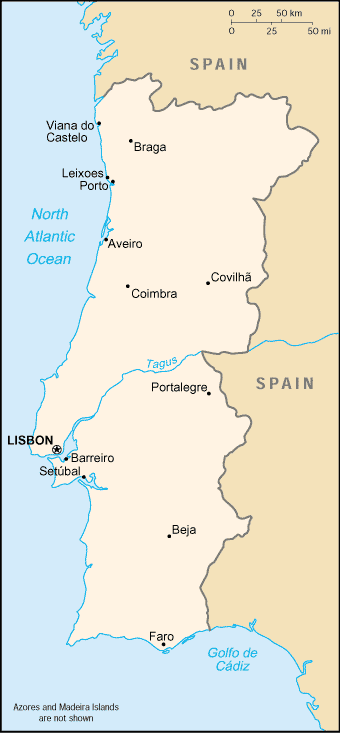Portugal
The Republic of Portugal (Portuguese: República Portuguesa) is a democratic republic located on the west and southwest parts of the Iberian Peninsula in southwestern Europe, and is the westernmost country in continental Europe. Portugal is bordered by Spain to the north and east and by the Atlantic Ocean to the west and south. In addition, Portugal includes several island territories in the Atlantic, such as the Azores (Açores) and Madeira and Porto Santo (including the Savage Islands). In the early first millennium BC, several waves of Celts invaded Portugal from Central Europe and intermarried with local peoples, the Iberians, forming the Celt-Iberians. In 238 BC, the Carthaginians occupied the Iberian coasts. In 219 BC, the first Roman troops invaded the Iberian Peninsula, driving the Carthaginians out in the Punic Wars. The Roman conquest of Portugal started from the south, where they found friendly natives, the Conii. Over decades, the Romans increased their sphere of control. But in 194 BC a rebellion began in the north, the Lusitanians successfully held off the Romans, took back land and ransacked Conistorgis, the Conii capital, because of their alliance with Rome. Viriathus, the Lusitanian leader, drove the Roman forces out. Rome sent numerous legions, but success was only achieved by bribing Lusitanian officials to kill their own leader. During this period, a process of Romanization was carried out, leading Lusitania to gain Latin Right in 73 AD. In the 5th century, Germanic barbarian tribes, most notably the Suevi and the Visigoths, invaded the Iberian peninsula, set up kingdoms, and became assimilated. The Vandals (Silingi and Hasdingi) and the sarmatian Alans, were also present, but were both expelled or partially integrated by the Visigoths. An Islamic invasion took place in 711. Many of the ousted nobles took refuge in the unconquered north Asturian highlands. From there they aimed to reconquer their lands from the Moors (mainly Berber with some Arab, mainly expelled after the Christian reconquest or Reconquista). In 868, Count Vímara Peres reconquered and governed the region between the Minho and Douro rivers. The county became known as Portucale (i.e. Portugal). In the following decades, Portugal created the conditions that would make it the pioneer in the exploration of the world. On July 25, 1415, the Portuguese Empire began when a Portuguese fleet, with King John I and his sons Duarte, Pedro, Henry the Navigator, and Afonso, along with the Portuguese supreme constable Nuno Álvares Pereira departed to besiege and conquer Ceuta in North Africa, a rich Islamic trade center. Henry the Navigator's interest in exploration, together with some technological developments in navigation, made Portugal's expansion possible and led to great advances in geographic knowledge. The discoveries were financed by the wealth of the Order of Christ, an order founded by King Denis for the Templar knights, who found refuge in Portugal after being pursued all over Europe. In 1578, the young King Sebastian decided to enlarge portuguese possesions in nothern Africa and, despite having no son and heir to the throne, decided to go personnaly into battle, where he was slain. Because Philip II of Spain was the son of a Portuguese princess, the Spanish ruler became Philip I of Portugal in 1581. Portugal formaly maintained its independent law, currency, colonies, and government, under a personal union between Portugal and Spain. The third Spanish king, Philip III tried to further enforce integration, openly attacking the Portuguese nobility that was not in his favour. In December 1, 1640, the Duke of Bragança, of the Portuguese Royal Family, John IV, was acclaimed after a revolutionary turmoil, and a Restoration War was fought for a few more years. A 1910 revolution deposed the Portuguese monarchy starting the First Republic. Political chaos, several strikes, harsh relations with the Church, and considerable economic problems aggravated by a disastrous military intervention in the First World War led to a military coup d'état in 1926, installing the Second Republic that would later become the Estado Novo in 1933, led by António de Oliveira Salazar, which transformed Portugal into a Fascist leaning state, which later evolved into some mixture of single party corporative regime. India invaded and annexed Portuguese India in 1961. Independence movements also became active in Angola, Mozambique and Portuguese Guinea, and a series of colonial wars started. The burden of so many overseas wars and the lack of political and civil freedoms led to the end of the regime after the Carnation Revolution in April 25 of 1974, an effectively bloodless left-wing military coup, that promised to install a new democratic regime. In 1975, Portugal had its first free multi-party elections, granted independence to its colonies in Africa. In the same year Indonesia invaded and annexed the Portuguese province of Timor in Asia before legal recognition of its independence by Portugal. In 1986, Portugal entered the EEC, today's European Union. In 1999, the Asian dependency of Macau, was returned to Chinese sovereignty, today seen as a success by China and Portugal. After a referendum in 1999, East Timor voted for independence and Portugal recognized it in 2002.
This article is licensed under the GNU Free Documentation License. It uses material from the Wikipedia article "Portugal".
|
||||||||||

